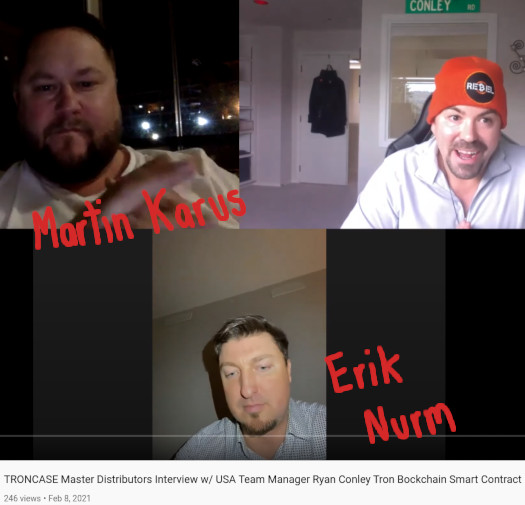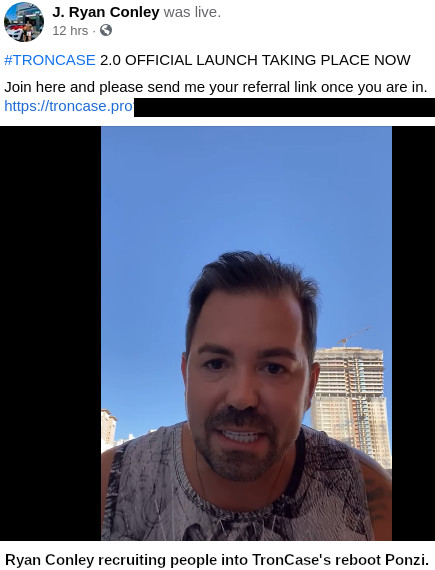TronCase launches new website, reboots Ponzi scheme
![]() Following its collapse earlier this week, TronCase has switched website domains and rebooted its Ponzi scheme.
Following its collapse earlier this week, TronCase has switched website domains and rebooted its Ponzi scheme.
The original TronCase Ponzi scheme operated from “troncase.io”. The TronCase reboot is operating from “troncase.pro”.
TronCase reboot domain was only registered two days ago on July 12th.
As far as I can tell there’s no difference between the TronCase websites. New domain, same smart-contract Ponzi script.
This will inevitably result in the same losses when TronCase’s reboot also inevitably collapses.
In the wake of TronCase’s collapse, admins Martin Karus and Erik Nurm have gone underground.
Karus abandoned his social media back in February. Karus took off in late June.

This has seen Ryan Conley step in as the face of TronCase.
Addressing TronCase’s collapse, Conley stated “there’s a lot of questions that I can’t answer about this”.
I cannot give away this information. I know a lot of you guys want answers and, just… I need a little piece of mind.
As part of those efforts, Conley is “denying” phone calls from his TronCase victims.
Conley dismisses criticism of TronCase as coming from people who are “hurting financially” (well gee, I wonder why that is).
The TronCase reboot Ponzi contract was created on July 11th, roughly around the time of the original’s collapse. The contract currently has a balance of 4.5 million TRX (~$275,000 USD).
Conley, believed to be one of the biggest earners in TronCase, blames the collapse on “some guy”.

Despite the mathematical certainty that all Ponzi schemes collapse, Conley claims “no one anticipated what happened”.
Conley is pitching TronCase’s reboot as a way to “give money back to the people” who lost in the original Ponzi scheme.
Seeing as Ponzi schemes are a zero-sum equation, this is of course mathematically impossible. At least not without new victims losing more money.
Update 24th September 2021 – Ryan Conley’s TronCase reboot has also collapsed.


Fun fact: Rabu Gary made a post in his UIGI (United Investors Group International) Facebook group that he is not touching Troncase 2.0 and turned off comments on that post -:)
Will that make him sleep better now?
I’ve said it before,i’ll say it pre-emptively this time. Fuckoff Ryan Conley.
C’mon, Oz, ol’ “Ryze ‘n’ Scammy” said “you eat your words,” and you’re not playing along. You didn’t even nibble on a single syllable. No fair!
And Ryze or Ryan or whoever the hell you are, if you’re reading this, maybe get a real job and try not being the puss-filled pimple on humanity’s butt for a change? Kthxbai.
f’ing POS Ryan Conley still out there scamming everyone!
I am so tired of seeing these habitual scammers free from prison sentences! People like Conley, Faith Sloan…. etc need to be locked up!
Amen, and amen!
Give me popcorn or give me death!
Philosophical question: Is it still scamming if all participants know how the game works. Everyone knows the thrill, right?
It’s hard to believe that there are people out there thinking that a 1% daily deal can be legit. They all know what they invest in.
So it is legimate to call the top leaders scammers? They just provide a opportunity to people who love the thrill and get rewarded for that.
Food for thought.
They exist, greed+financial education is an issue everywhere.
Thief’s a thief not because of what he knows or not,but because of what he does – namely stealing.
Of course it is. Ponzi schemes like TronCase are marketed on fraudulent claims:
Victims are signed up on lies. This is how every MLM Ponzi scheme is marketed.
The only time bUt eVeRyOnE kNeW iT wAs A pOnZi! comes up is as a justification pushed by a Ponzi scheme’s owners and top net-winners.
They are scammers, each ad every one of them.
Actually,a little related interestingness
There was that one Cryptocurrency called Ponzitoken.
The FAQ contained stuff like this:
From techweez.com/2018/01/26/ponzicoin-crypto-scheme/
Now here’s the major news; People actually invested in the Ponzi scheme. Maybe with the hopes of being the early investors and cashing out before everything collapses.
After around 8 hours, PonziCoin had attracted attention and the platform had collected around 250 Ether coins ( valued at more than $250,000).
This was an almost “too good to be true” scam like the Bitcoin Revolution and other Bitcoin Robots that have emerged in late 2017’s.
…Mr Rishab seems to have gotten cold feet due to the attention and he decided to pull the plug on PonziCoin, leaving investors out it the cold and possibly making away with their money since none of the investors got a payout on their investment.
An update on the website reads:
Whenever we start to have faith in humanity, people just go ahead and prove us wrong by proving that there will always be greater fools out there.
So the question, within the context of the original question, is whether Rishab is a scammer.
Of course he is.
Announcing a scam as a scam doesn’t somehow not make it a scam and admins and net-winners scammers.
Walking into a bank and announcing you’re robbing the place and then robbing it doesn’t change the fact you stole money and are a thief.
As far as MLM Ponzi schemes go, deception is baked in. And even if a Ponzi scheme was open about being a Ponzi scheme, securities fraud still makes you a scammer.
Ponzi pusher Sal Khal is involved once again..
youtu.be/RwWeAcacC5M
It’s like the nOt fInAnCiAl aDvIcE crowd spewing Financial advice.
Oz, I would agree with the bank robbery analogy if every bank client knew that the bank can be robbed anytime.
Ponzi investors know that their money can be gone anytime. Bank clients think their money is safe.
This is going down a long arduous trundle.
By your earlier statement about everyone should know 1% is not possible – I could say that everyone should be aware that banks are not impervious either.
Announced or no,obvious or no,it’s illegal,it’s theft,and its scummy and scammy. Participants are all complicit willingly or not.
A bank is insured. Even if a bank is incompetent your money is safe and effectively underwritten by the government in large parts of the world. A ponzi is a black hole.
Literally says on TronCase’s website:
But it’s OK to lie if everyone knows it’s a lie (goes the flawed reasoning of Ari Scammabi).
@(Other) Ari: I see the point you’re trying to make; I just don’t think it’s a valid one. Whether the participants believed the lie or not, running a scam is still running a scam, and it’s still illegal.
So Ari Scammabi since everyone “KNOWS” they are participating in a Ponzi, they can’t be victims when it fails. Also since they are willing accomplices in the commission of a crime, they can be charged just like the perps running the Ponzi.
It also means that the major pimps and members of this Ponzi can’t claim they were duped, lied to, had no clue it wasn’t a Ponzi BS they always spout when the Ponzi collapses.
The moment one of you willing accomplices gets charged criminally, the story will change to you had no idea it was a Ponzi, you were lied to, you were duped; you know the usual BS that is trotted out when your Ponzi de Jour goes tits up.
But thanks for admitting you know it is a Ponzi and you don’t care as long as you get yours. Sucks doesn’t it you aren’t fooling anyone.
I’m just watching this very specific industry (I know it’s not an industry. Couldn’t find a better word) for a while.
It seems like different regions have different business ethics.
E.g. Russian speaking leaders would typically openly admit it’s a Ponzi when promoting it. And typically they won’t be called scammers after it collapses since they told everyone it’s a Ponzi.
Outside of the Russian speaking world leaders typically sell every Ponzi as real business. If they tell everyone upfront it’s a Ponzi, they will be called scammers right away.
Russian leaders will have an easier job after the Ponzi collapsed. All they have to do is to say “I told you it’s a Ponzi.”.
Non-Russians will have to come up with all sorts of excuses like “I was fooled too” or “I lost money too.” In reality, everyone knew it was a Ponzi but people still blame leaders for being scammers.
I heard the Chinese are also openly telling people if it’s a Ponzi, but couldn’t verify that.
I guess the Russian speaking world is just a more mature market with a long history of Ponzis. Beginning with Mavrodi in the 90s. And with Questra being the biggest Ponzi of modern times.
Risky business to even run one, let alone in the open, they sentence people to death for financial crimes there:
wsj.com/articles/SB10001424127887323398204578488831032664720